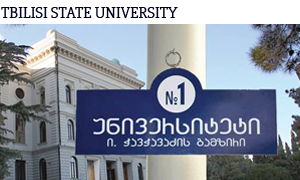
The Ivane Javakhishvili Tbilisi State University (TSU) provides Georgian scientists with an opportunity to join and work in the Grid computing system. A presentation of the project “Development of Grid Infrastructure and Services to Support Research Communities in Georgia” was held at TSU on March 30. TSU Rector, Academician Vladimer Papava, representatives of Shota Rustaveli National Science Foundation, scientists, researchers and students attended the event.
For the full scale cooperation in large international research projects in the fields of high energy physics, biology, meteorology and climate change, seismology etc. it is essential to have developed Grid facility in the country. TSU, with the financial support of the Shota Rustaveli National Science Foundation, will enable Georgian scientists to solve large tasks through the so called “virtual supercomputer.”
TSU Rector, Vladimer Papava said: “The project is extremely important not only for the scientists from our university, but for all scientists in our country. This large virtual network enables planning and using difficult and large tasks without territorial restrictions. This is a new word for the expansion of scientific and research activities.”
“Scientists from the TSU Department of Physical Chemistry are actively using Grid infrastructure. One computer requires much time and cannot fulfill large tasks quickly. So, a new computer system was created, which is very useful to the scientists and helps us conduct research activities. This project proved extremely effective,” TSU Professor Jumber Kereselidze said.
Grid computing is the collection of computer resources from multiple locations to reach a common goal. The grid can be thought of as a distributed system with non-interactive workloads that involve a large number of files.
TSU, in cooperation with Georgian Research and Educational Networking Association (GRENA), is implementing the project financed by Shota Rustaveli National Science Foundation – “Development of Grid Infrastructure and Services to Support Research Communities in Georgia.”
The strategic objective of proposed project is to support Georgian research teams fully explore established new possibilities in their scientific work by providing easy and transparent access to the modern Grid infrastructure and services.
Proposed trainings and user support activities will ensure effective usage of created infrastructure by the Georgian research groups and further stimulate the effective use of created opportunities in solution of research tasks.
For the full scale cooperation in large international research projects in the fields of high energy physics, biology, meteorology and climate change, seismology etc. it is essential to have developed Grid facility in the country incorporated in the European Grid Initiative. Thus, Grid infrastructure is becoming the key enabler for the integration of scientific potential of Georgia in the European Research Area.
With the support of the project, Grid Certification Authority (TSU CA) was established at the Tbilisi State University in 2014, which is recognized by the global grid system. TSU CA provides Georgian scientists with the opportunity to obtain Grid certificates in case of virtual organization membership and respectively perform research tasks using Georgian and global Grid infrastructure.
Information about the project is available at http://grid.grena.ge and information about the Certification Authority is available at https://grid-ca.tsu.ge, where all interested persons can find instructions on obtaining, updating and using Grid certificates.



